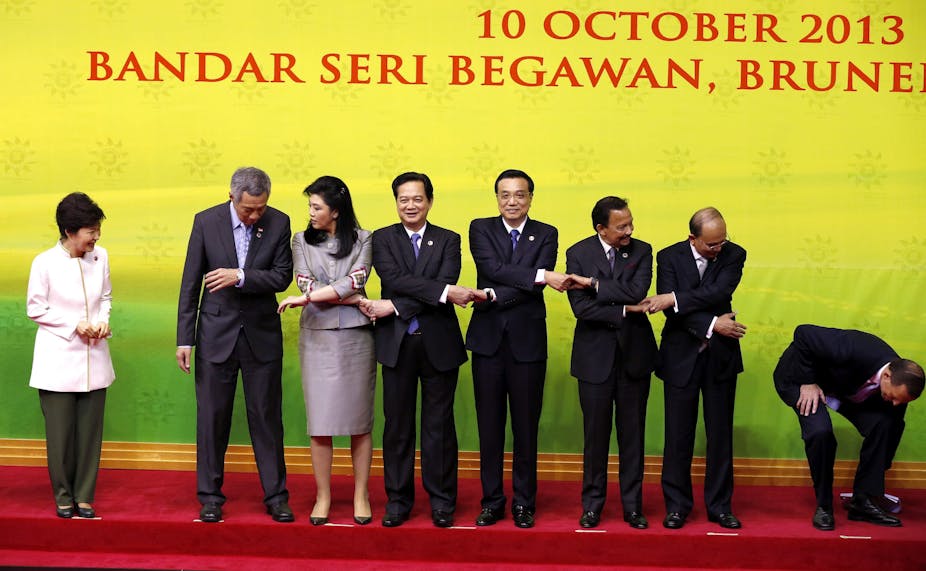Events on either side of the Bay of Bengal illustrate the contrasting fortunes of democracy in Asia. Notwithstanding questions about his role in anti-Muslim violence, Narendra Modi stormed to a huge victory in India’s five-yearly Lok Sabha elections. In a massive and diverse society the electoral process works remarkably well. The ballots of more than 500 million electors in 2014 put power overwhelmingly into the hands of Gujarat’s controversial chief minister.
Events in Thailand stand in stark contrast to this orderly transfer of power as army chief General Prayuth Chan-ocha seized power in the country’s 12th coup d’état since 1932. So far international reaction has generally been muted, with most states encouraging dialogue and calling on all parties to refrain from violence.
Liberal democracy has had a fragile existence in the Thai kingdom. This latest coup, following on an earlier seizure of power by the military in 2006, is the product of an increasingly divided society. Thailand’s competing groups – the royalist elites in Bangkok, the poor and emerging middle classes from the rural northern provinces and the military – are unprepared to accept the terms of the democratic deal that the current constitution delivers.
Prayuth has assumed sweeping powers, initially without royal approval, has detained key figures from both sides and has suspended key freedoms.
An added complication this time around is the parlous health of the king. In the past he had been able to broker some kind of uneasy truce between the parties due to his standing in society. A protracted period of repressive military rule is a very real prospect.
How international society responds to coups d’état varies greatly. For example, the 1991 cancellation of the election results in Burma led to a military junta, which became subject to a wide array of international sanctions. These have only recently been eased after a rapid, albeit limited, liberalisation in 2012. Other coups have been accepted almost gratefully, perhaps most notably in Indonesia in the mid-1960s.
No prospect of a united response
Democracies such as Australia and Japan have tended to exhort a speedy return of the constitution and the rule of law while authoritarian states, such as China, have expressed their desire to see a return to “normal” order. The United States has taken the strongest symbolic steps so far. Secretary of State John Kerry announced that Washington will review its extensive military links to the kingdom.
The premier regional organisation, the Association of Southeast Asian Nations (ASEAN), has and will remain impartial. This is not because of some kind of coup fatigue. Since its founding in 1967 non-interference in the domestic affairs of its members has been a fundamental principle of the grouping.
The origins of this principle lie in the traumas of communist insurgencies of the early Cold War period and a jealous protection of sovereignty newly won from imperial powers. Although ASEAN has begun to explore forms of cooperation that nibble away at the edges of this, such as free trade agreements, it will strongly adhere to the idea that domestic political developments are purely a matter for the state concerned.
Beyond the organisation itself, the other nine members of the association are likely to follow this lead in public at least. The values of ASEAN are intended to guide the behaviour of the states in their dealings with one other as well as the group as a whole.
Behind the scenes, however, things are rather more complex. States in southeast Asia are acutely aware of the ways in which developments in one of them can have sudden and dramatic knock-on consequences across the region. The seismic economic and political events of the 1997-98 Asian financial crisis are still etched firmly in the mind.
Within ASEAN, a division is growing between the more developed, globalised and liberally oriented ASEAN states and those that are underdeveloped and authoritarian. Indonesia and the Philippines have rather different perspectives on events in Bangkok than Vietnam and Myanmar.
Great power rivalry sways calculations

A further complication is the shadow of great power rivalry. Thailand has a long-standing close relationship with the US. With Washington coming down relatively hard on Thailand, rhetorically at least, China may see a chance to strengthen its hand in southeast Asia by providing aid and other support.
The other problem the international community faces lies in the rather limited menu of diplomatic options available as a response to the coup. Economic sanctions would greatly harm Thai citizenry as well as the many foreign firms on whom the economy depends. Isolation has not proven to be an especially effective strategy. ASEAN claims that its cautious but consistent engagement with Myanmar worked much better than Western sanctions in producing political change in Naypyidaw.
While it appears on the surface that international reaction to the Thai coup is fairly limited, behind the scenes there is considerable concern in regional capitals. In the past Thai coups have not lasted long, with some kind of political compromise arrived at relatively quickly. Thai watchers think this time things will be different, particularly given the coup’s belated royal approval and the nature of the political deadlock that prompted military action.
For liberally oriented states that want Thailand to retain its ties to the US, the coup presents a genuine conundrum. The fall of a democratically elected government is something to which one ought to respond, yet working out how to do so in ways that advance one’s interest is rather more complex. The ASEAN approach of quiet diplomatic engagement is likely to prevail over the short to medium term.

